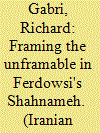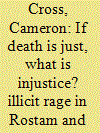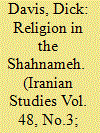|
|
|
Sort Order |
|
|
|
Items / Page
|
|
|
|
|
|
|
| Srl | Item |
| 1 |
ID:
137391


|
|
|
|
|
| Summary/Abstract |
This paper explores the ways in which the Shahnameh thematizes the poet's fraught relationship with language to not only complicate our overall understanding of the epic poem but also our understanding of the language which makes the poem, and the world outside the poem, intelligible. Through a close reading of some of the prologues and epilogues that frame the Shahnameh’s tales, this essay argues that rather than helping us understand how to interpret the epic's morally ambiguous tales, the frames to Ferdowsi's tales, ironically represent a narrator who is in no position to offer us any help. Of course, the poet does give us clues as to why he and consequently we are “helpless” (bichāreh) when it comes to understanding his tales, which, in its own way, can be considered helpful. What seems to hinder understanding at every turn for the poet is, paradoxically, the very language or speech (sakhon/sokhan) that makes understanding possible in the first place.
|
|
|
|
|
|
|
|
|
|
|
|
|
|
|
|
| 2 |
ID:
137390


|
|
|
|
|
| Summary/Abstract |
This is a comparative study of anger and narrative control in two tragic stories cast in an epic-heroic register, the “Tale of Rostam and Sohrab” of Ferdowsi's Shahnameh and “The Knight's Tale” of Chaucer's Canterbury Tales. The narrators of both stories are heavily invested in upholding a certain normative interpretation of the events they recount, a fatalistic worldview that justifies itself through the necessarily agnostic optimism that these senseless catastrophes gain meaning when situated within a greater order that is beyond the capacity of man to comprehend. The emotional responses of outrage and grief therefore have no legitimate place in this worldview, and must be submitted to a process of rationalization and violent suppression in order to be kept in check. However, this same process also reveals the underlying aporias of its own normative logic, producing a subtextual counter-narrative that resists and undermines the dominant voice of the text. The resulting fragmentation and narrative collapse provides a fruitful opportunity to investigate how both texts respond to a crucial ontological topic in medieval literature and philosophy: what does it mean to be an autonomous subject within a divinely ordered universe, and how can one distinguish justice from tyranny in a world entirely governed by fate?
|
|
|
|
|
|
|
|
|
|
|
|
|
|
|
|
| 3 |
ID:
137387


|
|
|
|
|
| Summary/Abstract |
This article discusses the reasons why Ferdowsi does not begin the Shahnameh with the episode of Zoroaster, which he quotes from the version of Daqiqi, but rather with an account of the creation of the world that, in contrast to Islamic historians writing before Ferdowsi, does not attempt to accommodate a Qur'anic view of creation and human history, but neither does he give a cosmology dominated or well informed by Zoroastrian theology. Similarly, Ferdowsi tends to present pre-Islamic Iran as having a consistent religious history, and perhaps avoids beginning with Goshtāsp's conversion to the religion of Zoroaster, as he makes Daqiqi appear to do, in order to minimize the role of religious conflict in Iranian history, again diverging from historians of the Islamic period writing before him. The article also explores the role of God in the Shahnameh and the absence of theodicy.
|
|
|
|
|
|
|
|
|
|
|
|
|
|
|
|
|
|
|
|
|